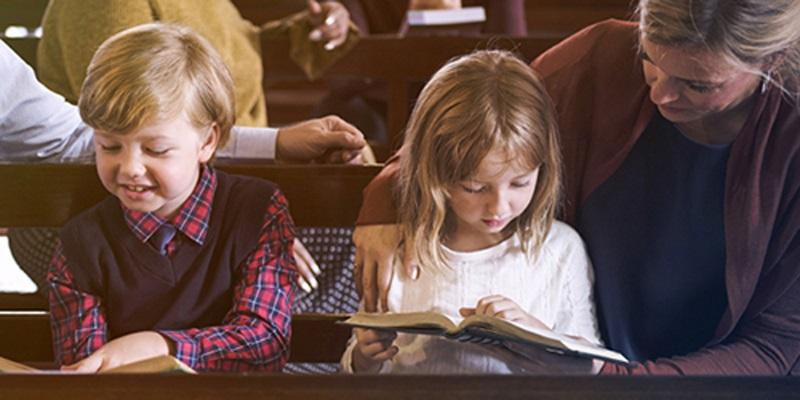Children under the Preaching of the Word
Children under the Preaching of the Word
Children obey your parents in the Lord, for this is right.
Ephesians 6:1

The place of children in the worship services, is a well covered topic for discussion among us. What do children get out of our reformed Church services? Is it not better to have them gather in a separate room, listening to a story adapted to their level of understanding?
If we answer that in the negative, believing that children belong in the worship service, is enough then done to involve them in the services?
In the light of Scripture, we offer some remarks in connection with the above mentioned text, which is one of the very few In Scripture where children are addressed separately.
Children Belong There⤒🔗
The epistles, found in the New Testament, are, in the majority of cases, letters addressed to congregations. Letters to congregations in cities like: Rome, Corinth, Thessalonica, etc. Letters to congregations in regions such as: Pontus, Galatia, Cappadocia; letters to the seven congregations in Asia-minor.
They were designated to be read in the gatherings of the congregation (Colossians 4:16; I Thessalonians 5:27; Revelation 2:11,17 etc.), and are generally presented in a manner directly addressing the brothers and sisters. They do not speak about them, but to them; second person. The letter to the Hebrews can even be classified as a 'word of admonition' (Hebrews 13:22).
In Ephesians 6:1 and Colossians 3:20, Paul specifically addresses the children, with a direct command at their address: “Children obey your parents”, clearly showing that the apostle expected the children to be in church when his letters are read out. They belong to God's covenant. (Deuteronomy 29:11; Joshua 8:35). They also belong to the brothers and sisters in the churches addressed here.
No Simplification←⤒🔗
Paul thus expected the children to be in Church when his letters were read out. But those who think that this could be noticed in difficulty-level of his epistles, are certainly wrong. Reading the Epistle to the Ephesians or the Colossians does not exactly give the impression that the apostle has taken the children's level of understanding into account. Even adults do not always find Ephesians 1 very easy, and that is not a “one off” either. The letters to the Colossians and that to the Hebrews (not Paul's), can hardly be classed as easily digestible.
Paul was obviously not aware of the modern term: “child-friendly.” On occasion his writings are difficult to understand (2 Peter 3:16), nor was his speech always absorbing (I Corinthians 2:4). We even hear of a young man who fell asleep during one of Paul's, “hours-long” sermon (Acts 20:9). It is certainly not Paul's intention to present his readers with “milk.” Rather, he reproaches them for not yet being able to take “solids” (I Corinthians 3:1,2).
The author of the epistle to the Hebrews is of the same opinion. His readers, according to time, should have been teachers, but instead they have come no further than the very basics.
They still exist on “milk”, while in fact it is high time for the solids of the true preaching (5:12-6:2)

That we must become like a child, to receive the kingdom of God, does not mean that the preaching should be brought down to child level. Scripture does not give that example, nor does it encourage us to do so.
Obey Your Parents←⤒🔗
Our text contains a special message from the apostle to the children in the Church. And it is worthwhile to consider the contents of that message.
The first thing we notice is, that the apostle does not summarise in simplified terms what he has written in the previous difficult chapters. Indeed, when he addresses the children in particular, he speaks to them of something that concerns them especially: “Children obey your parents in the Lord.” Paul takes the child in its position as child, seriously. It is addressed as child.
This observation is important for our Church services: the child does not determine the composition of the sermon. It is not in the nature of the child, to dominate the tone of the church service. In Church, the child remains child. When Scripture addresses the child specifically, it does that sporadically and within the realm of childhood. It is not given a child-like explanation in every letter, about what the Lord expects from the congregation as a whole. Children are told what the Lord expects from them in their own humble corner. Like in our text: to obey their parents.
Within the Church, children experience a learning process. Because of that, clear sermons are a must and aids to listening are welcome. However, children do not need to prepare for an exam on teachings of child-faith. Anyway, for what age would you set such an exam? Age five, or nine? That already, makes a whole lot of difference! No, even as you do not have to deal with the doctrine of election and rejection, at the youngest catechism classes, you do in Church, not have to explain the doctrine of the Trinity on the child's level. And to the extent that they can not completely comprehend it today, they will later. The Holy Spirit works in each of us according to the measure of our years (Calvin).
Let us be realistic: do child-level sermons not often provide more for the desire of the adults, than that they fulfill a deep desire in the children?
The Task of the Parents←⤒🔗
It is striking that the apostle refers the children in the Church, to their parents! That too, is 'within the nature of the child'. Children depend on their parents for learning to speak, for developing correct table manners, for learning how to tie shoelaces.
This is also true in the covenantal sense. Children belong, just like, and together with their believing parents in God's Covenant and with His congregation (Genesis 17:7; Acts 2:39). The first feeling of trust a child feels at his mother's breast (Psalm 22:9). In the discipline and admonition of the Lord, the children are raised by their fathers (Ephesians 6:4). In the first instance the baptismal parents are the ones who teach the children to live for and with the Lord (third baptismal question). And little children do not learn to believe by having explained to them what faith is and why it so important. In the first instance, they learn it because they automatically follow in the life-style of their believing parents (R.A. Houtman, in Zo Nemen Wij De Kinderen Mee; p 49). '
That is also important for the worship services, young children, also concerning Church attendance, follow in the footsteps of the parents. At the profession of their faith, young people announce publicly that they no longer come to Church because of their parents, but that they themselves want to serve the Lord. Up to that moment children come to Church with their parents. And concerning questions about the Church service, the parents, in the first instance, are the ones to explain and answer.
Some feel that, referring the children to their parents, is “fobbing them off.” But that is not the apostle's intention at all. To him this matter is important. By way of their parents, it is the Lord Himself, Who works with them. Look at what the apostle says:
Children obey your parents in the Lord.
And Paul emphatically adds: … for that is right.
Or with Colossians 3:20: … for this is well pleasing to the Lord.

Over the everyday upbringing by the parents, shines the wondrous lustre of our God and of His good pleasure in Christ.
Anyone who wants to know just how valuable father’s and mother's instructions are, can refer to the book of Proverbs. Whether the addressee is a student in philosophy or a son who is preparing to become independent and leave the parental home, he is given the specific instruction never to forget what his parents taught him or ever deviate from it. For what his parents taught him, is knowledge he received from the Lord. (Proverbs 4:3-7; also comp. HJJ. Feenstra, Wees Wijs Met De Wijsheid, 17-21). Many aids are available to assist our fathers and mothers in their parental task. Literature has been published to help the Christian upbringing of the children. As a rule they can send their children to a reformed school. When the children get older there are the catechism classes, as well as the young and older youth clubs. We need not be told that, within the church, too little is done for our youth. To them it is often too much! Far too much, if we can believe them.
Children←⤒🔗
In Church, children are allowed to be children. Unless there is a primary school project where they are addressed at their own level, they will understand little of what happens in Church. They are there, but often that is where it stops. For the rest…?
Let no-one scorn lack of understanding.
Our baptismal form has a beautiful expression when it concerns the children's lack of understanding:
Although our children do not understand all this, we may not therefore exclude from baptism.
Note! It does not say: Although they do not understand all this, we must still allow them to be baptised. It says: “… not exclude them.” The Lord works in them, He has included them in His covenant and He wants to see that sealed to them. Their lack of knowledge does not negate that.
Just as they share without their knowledge in the condemnation of Adam, so are they without their knowledge received into grace in Christ.
This also applies to the Church services. Even though our children have very little idea of what the Church services are all about, the Lord is busy with them and has them share in the blessings of His Covenant and of His Gospel. The blood of Christ is, in the Church services not sprinkled on the adults only, but also on the children:
… we thank and praise Thee that Thou hast forgiven us and our children all our sins through the blood of Thy beloved Son, Jesus Christ. Thou hast received us through Thy Holy Spirit as members of Thy Son, and so adopted us to be Thy children.
Although our children do not understand this, we do not exclude them from it.
This tells us much about our God. Without despising the 'the means', we may say that the Lord is not bound to our cognitive and informative level, to have us partake in the blessings in Christ. Our young children do not fit in with our Bible study clubs. They are not ready for that. But it is different with the Church services. For the sermon is about more than learning and discussing. Especially in the children during the sermon, we see how God's Spirit works, even without us having an apparent antenna. Our God Who perfects praise from the play of children (Matthew 21:15,16), and from the mouth of infants (Psalm 8:3), is happy with the presence of our children. He works in them while they lean against their mother, suck their peppermint, count organ pipes, detect patterns in the wall cladding, make eye contact with fellow class mates, or beam smiles at aunty this or uncle that.
The work of God's Spirit in these children, according to the measure of their age, silences many a child psychologist or minister.
Children attend Church as children. That is what the Lord allows.
This means that they do not attend … because they know that the message brought in Church, concerns them also, or will apply to them in a special way. They love to go to Church, because their parents love to go. They enjoy it, when their parents enjoy it and relate that joy to the children.R.A. Houtman
They observe their parents, listening intently, and sing from the heart. Then, at home they emulate them in their play: when they are big they want to listen and sing like that too.
Church Service←⤒🔗
Children may remain children. And the Church service must remain Church service!
A Church Service is more than a Bible study meeting, and a sermon is more than a Bible story or an introduction.
In a church service the entire congregation comes together: all ages, all social levels, all intelligence levels, all characters. The children belong there as well.
The heart of the Church service is the proclamation of the Gospel of Christ. A Church service without a sermon is for the children also, a 'liturgical monster' (Christ. Trimp, Woord, Water En Wijn, 17).
The Church service also has its own level and content. A colour poster is for the child, yes, but not for the church. That is what you get from the school doctor or dentist, that is, if you do not pick a balloon instead.
Let us watch out for narrow minded complaints or parochial attitudes. Our children do not only derive value from a church service if they are given a colour poster. Theirs is the kingdom of heaven said our Saviour (Matthew 19:14). During the Church service the blood of Christ is also sprinkled on them, said Calvin. Let parents find peace and joy in that knowledge! He who has been to Church, has been with the LORD, the God of the Covenant. No matter how small their children, they may come with them, also to be with Him. For He, the most Holy God is also for the smallest among us. Even though they do not understand it, He does not exclude them. And when they get older, they will thank and praise Him for the instruction they received from Him, already in their youth (Psalm 71:7).

Add new comment